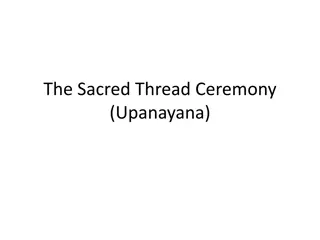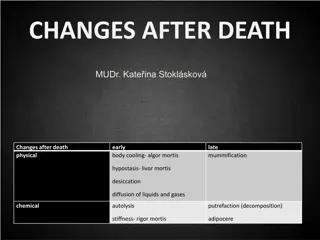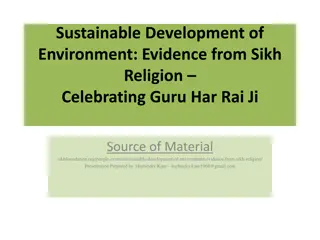Guru Har Krishan and Sikh Beliefs about Death
Guru Har Krishan, at a young age, cared for those dying in a smallpox outbreak in Delhi, showcasing Sikh beliefs in reincarnation and mukti. Sikhs believe in life, death, and freedom from the cycle of rebirth to unite with God. The purpose of life on earth is to make one's mind God's home and attain liberation from reincarnation.
Download Presentation

Please find below an Image/Link to download the presentation.
The content on the website is provided AS IS for your information and personal use only. It may not be sold, licensed, or shared on other websites without obtaining consent from the author.If you encounter any issues during the download, it is possible that the publisher has removed the file from their server.
You are allowed to download the files provided on this website for personal or commercial use, subject to the condition that they are used lawfully. All files are the property of their respective owners.
The content on the website is provided AS IS for your information and personal use only. It may not be sold, licensed, or shared on other websites without obtaining consent from the author.
E N D
Presentation Transcript
Guru Har Krishan Aim: How did Guru Har Krishan care for those who were dying? What do Sikhs believe about death?
Pair and share- what does this hymn teach us about Sikh beliefs about life and death: The dawn of a new day is the herald of a sunset, Earth is not our permanent home. Life is like a shadow on a wall. Image credit: Sikhs at a funeral. Photographed 1920's, United States By Unknown author - [1], Public Domain, https://commons.wikimedia.org/w/index.php?curid=135710036
Sikh beliefs about death Sikhs believe in reincarnation Birth into the Sikh faith is the result of good karma It has provided the soul with the opportunity to hear the words of the Gurus and to receive freedom from the cycle of death and rebirth and become one with God, this is called mukti. Image Credit: By John Hill - Own work, CC BY-SA 4.0, https://commons.wikimedia.org/w/ind ex.php?curid=63727095
Life Death Mukti freedom from the cycle, and union with God Reincarnation
Guru Har Krishan He was only 5 years old when he became the Guru He was invited to Delhi, where he preached Delhi became the centre of a smallpox outbreak, with 30% fatality rate Guru Har Krishnan stayed to help the smallpox victims Aged 8, he too died of smallpox How might his beliefs about death influenced his decision to help the sick?
A Sikh funeral In India the body is usually cremated on the day of death but in the UK the funeral will take place as soon as possible. First the body is washed and then dressed, usually with the traditional dress of a Khalsa Sikh
A service is held at the Gurdwara and then the body is taken to the crematorium. During the cremation hymns from the Guru Granth Sahib are sung and special prayers are said.
The Kirtan Sohila (Evening/ funeral prayer) Know the real purpose of being here, gather up treasure under the guidance of the Sat Guru (True Guru). Make your mind God s home. If God abides with you undisturbed you will not be reborn. What do you think is the purpose of being here on earth? Image credit: By http://lakhvir.wordpress.com/2006/07/11/rarely-seen-images-of-the-sikh- past-part-i/, Public Domain, https://en.wikipedia.org/w/index.php?curid=28019116
Often the ashes are placed in water (sea or river) or buried. Mourning lasts for up to ten days. During this time there is a complete reading of the Guru Granth Sahib. The mourning ends with the sharing of Karah Parshad.
Sikhs do not have headstones or memorials to people who have died. They believe that the good things that a person has done in their life is the way they are remembered. If there was no memorial stone to commemorate your life what good things would you hope people would remember you for?























